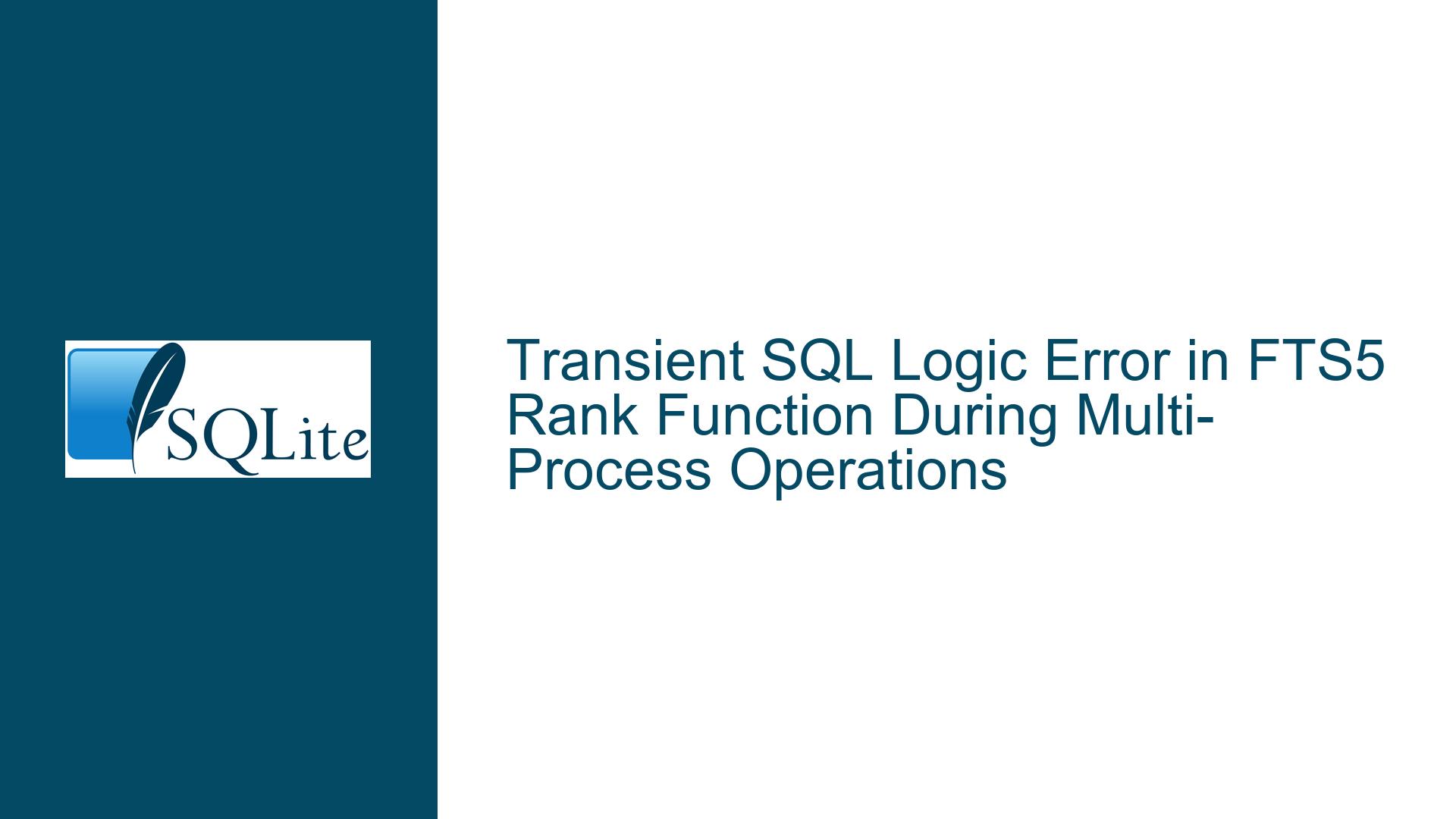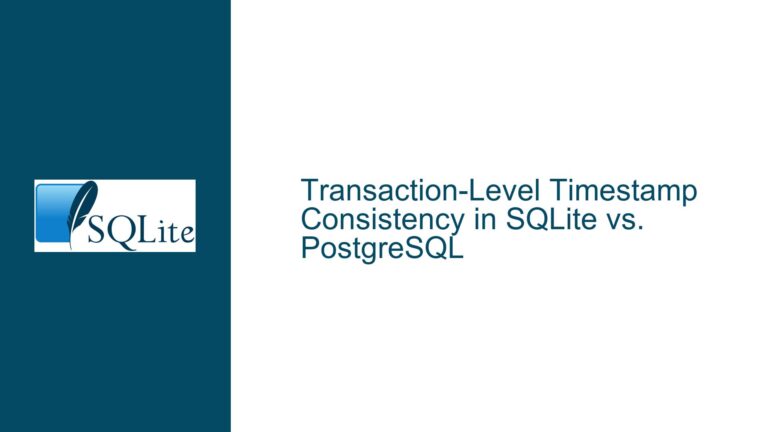Transient SQL Logic Error in FTS5 Rank Function During Multi-Process Operations
Issue Overview: Transient SQL Logic Error in FTS5 Rank Function During Multi-Process Operations
The core issue revolves around a transient "SQL logic error" that occurs when using the Full-Text Search 5 (FTS5) extension in SQLite, specifically when interacting with the rank function in a multi-process environment. The error manifests under the following conditions:
- The
rankfunction is configured using theINSERT INTO t(t, rank)command, wheretis the FTS5 virtual table andrankis the ranking function (e.g.,bm25(10.0, 1.0)). - The FTS5 table is queried in a separate process using a query that invokes the
rankfunction, such asSELECT *, rank FROM t('data*') ORDER BY RANK. - The
INSERT INTO t(t, rank)command is executed repeatedly in the first process while the second process attempts to query the table.
The error is transient, meaning it occurs intermittently and resolves itself upon re-execution of the query. However, the issue reappears if the INSERT INTO t(t, rank) command is executed again in the first process. Notably, the error does not occur if the ranking configuration is directly inserted into the t_config table using INSERT OR REPLACE INTO t_config(k, v).
This behavior suggests a synchronization or caching issue within the FTS5 module, particularly when the ranking function is dynamically updated in a multi-process context. The error is reproducible in SQLite version 3.40 and appears to be resolved in later versions, specifically after the check-in cb54c2da52d31758.
Possible Causes: Synchronization and Caching Issues in FTS5 Rank Function Configuration
The transient nature of the error and its dependency on multi-process operations point to several potential causes:
Inconsistent State in FTS5 Configuration Cache: The FTS5 module maintains an internal cache for ranking function configurations to optimize query performance. When the
INSERT INTO t(t, rank)command is executed, it updates this cache. However, in a multi-process environment, the cache may not be synchronized across processes, leading to inconsistent states. This inconsistency can cause therankfunction to fail temporarily until the cache is refreshed or reinitialized.Race Conditions During Rank Function Updates: The
INSERT INTO t(t, rank)command modifies the ranking function configuration, which is a shared resource. If one process updates the configuration while another process is executing a query that relies on it, a race condition can occur. This race condition may result in therankfunction being invoked with an incomplete or invalid configuration, triggering the SQL logic error.Improper Handling of Dynamic Configuration Changes: The FTS5 module may not fully support dynamic updates to the ranking function configuration in a multi-process context. When the configuration is updated using
INSERT INTO t(t, rank), the changes may not be immediately propagated to all processes. This delay can cause queries in other processes to use outdated or incorrect configurations, leading to errors.Version-Specific Bugs in SQLite 3.40: The issue appears to be specific to SQLite version 3.40, suggesting a bug in the FTS5 implementation. The bug may involve improper handling of ranking function configurations or insufficient synchronization mechanisms for multi-process operations. The resolution in later versions, particularly after the check-in
cb54c2da52d31758, supports this hypothesis.Direct Configuration Updates Bypassing the Cache: The fact that the error does not occur when using
INSERT OR REPLACE INTO t_config(k, v)indicates that this method bypasses the problematic caching mechanism. Directly updating thet_configtable ensures that the configuration changes are immediately and consistently applied across all processes, avoiding the transient errors associated with theINSERT INTO t(t, rank)command.
Troubleshooting Steps, Solutions & Fixes: Resolving Transient SQL Logic Errors in FTS5
To address the transient SQL logic error in FTS5, follow these detailed troubleshooting steps and solutions:
1. Upgrade to the Latest SQLite Version
The most straightforward solution is to upgrade to a version of SQLite that includes the fix for this issue. Specifically, ensure that your SQLite installation includes the check-in cb54c2da52d31758 or later. This check-in addresses the synchronization and caching issues in the FTS5 module, preventing the transient errors during multi-process operations.
To verify your SQLite version, execute the following command in the terminal:
SELECT sqlite_version();
If the version is earlier than 3.40 or does not include the relevant fix, download and compile the latest version from the SQLite website.
2. Use Direct Configuration Updates
If upgrading SQLite is not immediately feasible, modify your application to update the ranking function configuration directly in the t_config table. This approach bypasses the problematic caching mechanism and ensures consistent configuration across all processes.
Replace the INSERT INTO t(t, rank) command with:
INSERT OR REPLACE INTO t_config(k, v) VALUES ('rank', 'bm25(10.0, 1.0)');
This method ensures that the configuration changes are immediately applied and synchronized across all processes, eliminating the transient errors.
3. Implement Process Synchronization Mechanisms
If your application requires dynamic updates to the ranking function configuration using INSERT INTO t(t, rank), implement process synchronization mechanisms to prevent race conditions. For example, use file locks or named mutexes to ensure that only one process updates the configuration at a time.
In Python, you can use the fcntl module to implement file locks:
import fcntl
import sqlite3
# Open the database file
db_file = 'db.sqlite3'
with open(db_file, 'r') as f:
fcntl.flock(f, fcntl.LOCK_EX) # Acquire an exclusive lock
conn = sqlite3.connect(db_file)
cursor = conn.cursor()
cursor.execute("INSERT INTO t(t, rank) VALUES ('rank', 'bm25(10.0, 1.0)')")
conn.commit()
conn.close()
fcntl.flock(f, fcntl.LOCK_UN) # Release the lock
This ensures that only one process can update the ranking function configuration at a time, preventing race conditions and transient errors.
4. Monitor and Debug FTS5 Cache State
To gain deeper insights into the issue, monitor the state of the FTS5 cache during multi-process operations. Enable SQLite’s debugging features to log cache updates and query executions. This can help identify inconsistencies or delays in cache synchronization.
For example, use the following commands to enable debugging:
PRAGMA temp_store = MEMORY;
PRAGMA cache_size = -10000;
PRAGMA vdbe_trace = ON;
Analyze the debug logs to identify patterns or anomalies in the cache state that correlate with the transient errors.
5. Optimize Query Execution Timing
If the transient errors are caused by timing issues, optimize the timing of query executions to minimize conflicts with configuration updates. For example, introduce a short delay between configuration updates and subsequent queries to allow the cache to synchronize.
In Python, you can use the time.sleep() function to introduce a delay:
import time
import sqlite3
conn = sqlite3.connect('db.sqlite3')
cursor = conn.cursor()
cursor.execute("INSERT INTO t(t, rank) VALUES ('rank', 'bm25(10.0, 1.0)')")
conn.commit()
time.sleep(1) # Introduce a 1-second delay
cursor.execute("SELECT *, rank FROM t('data*') ORDER BY RANK")
results = cursor.fetchall()
conn.close()
This delay reduces the likelihood of transient errors by giving the FTS5 module time to synchronize the cache.
6. Report and Contribute to SQLite Development
If the issue persists despite the above solutions, report it to the SQLite development team. Provide detailed reproduction steps, debug logs, and any relevant code snippets. Contributing to the SQLite development process helps improve the software for all users.
Visit the SQLite Forum or submit a bug report through the SQLite Bug Tracking System. Include the following information:
- SQLite version and platform details.
- Steps to reproduce the issue.
- Debug logs and error messages.
- Any workarounds or solutions you have attempted.
By following these troubleshooting steps and solutions, you can effectively resolve the transient SQL logic error in FTS5 and ensure reliable multi-process operations in your SQLite-based applications.






